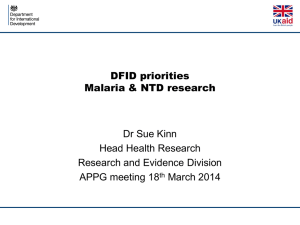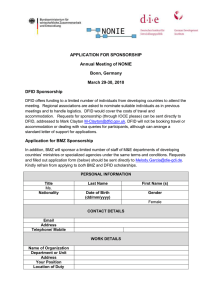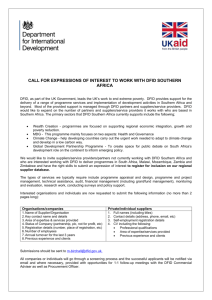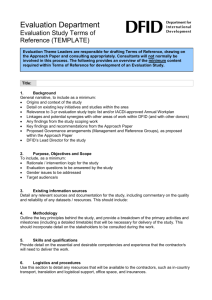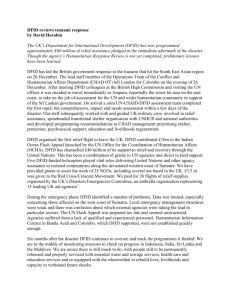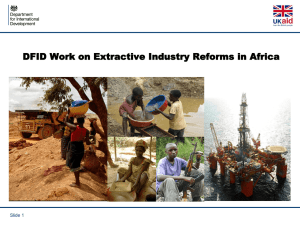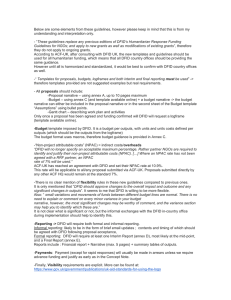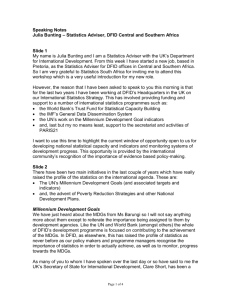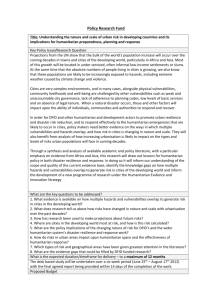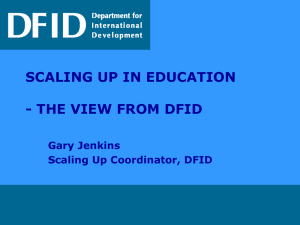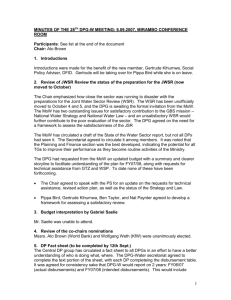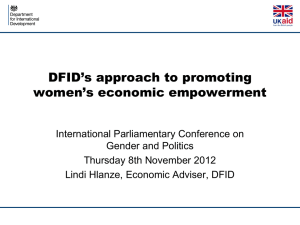PowerPoint Presentation - EU-CORD
advertisement
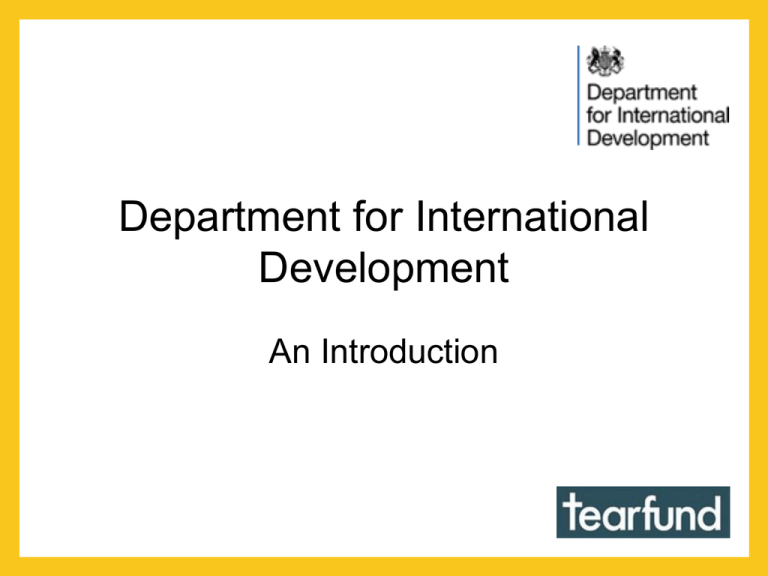
Department for International Development An Introduction History • Established 1997 under Labour Govt • Governmental department under a UK Government Minister – Justine Greening since September 2012 • Replaced Overseas Development Administration (ODA) Current Status UK Aid budget has been ringfenced from current cuts, but Ministers under pressure to justify spending Some of budget may be diverted to defence costs • Still seeking to reach 0.7% target by 2015 Priorities Education Economic Growth Climate & Water & Environment Sanitation Food & Nutrition Governance & Conflict Humanitarian Disasters & Emergencies Health Mid Year Review • Providing access to safe drinking water and improved sanitation and hygiene for up to 60 million people • Supporting 11 million children in school – more than we educate in the UK, but at 2.5% of the cost • Vaccinating more children against preventable diseases than the whole population of England • Stopping 250,000 babies dying unnecessarily • Saving the lives of 50,000 women in pregnancy and childbirth • Supporting 13 countries to hold free and fair elections Countries Current Funds Girls Education Challenge (now closed to applications) • Step Change Afghanistan, Sierra Leone, DRC, Ethiopia, Mozambique, Tanzania, Zimbabwe, Kenya and Somalia • Innovation • Strategic partnerships: Investing in business innovation and partnership for girls' education Afghanistan, Bangladesh, Burma, DR Congo, Ethiopia, Ghana, India, Kenya, Malawi, Mozambique, Nepal, Nigeria, Occupied Palestinian Territories, Pakistan, Rwanda, Sierra Leone, Somalia, South Sudan, Tanzania, Uganda, Zambia and Zimbabwe. Global Poverty Action Fund (GPAF) Main channel for NGOs working in community development and poverty reduction 2 main funds – Community partnership funds for grants of up to £250K; Impact Window for grants of £250K-£4 million over 3 years 25% Matched funding required for Impact window http://www.dfid.gov.uk/Work-with-us/Fundingopportunities/Not-for-profitorganisations/Global-Poverty-Action-Fund/ UK Aid Match A demand-led fund which matches public appeals for development activities focused on poverty reduction Expected to be further Call in May 2013 http://www.dfid.gov.uk/Work-withus/Funding-opportunities/Not-for-profitorganisations/UK-Aid-Match/ Common Ground Initiative • African development • UK-based small and Diaspora organisations (Annual Turnover of under £1 million) • £20 million total fund • http://www.dfid.gov.uk/Work-with-us/Fundingopportunities/Not-for-profitorganisations/Common-ground/ Conflict and Humanitarian Funding DFID issued new guidelines, which are for use when responding to a rapid on-set or sudden spike in a chronic emergency, usually for programming up to 12 months. http://www.dfid.gov.uk/work-withus/funding-opportunities/conflict-andhumanitarian/hrf/ Rapid Response Facility The Rapid Response Facility (RRF) enables DFID to commit to rapid humanitarian funding for pre-qualified partners, which includes Tearfund. This will be done in the first 72 hours following a rapid onset disaster, but has only been used once so far http://www.dfid.gov.uk/Work-with-us/Fundingopportunities/Conflict-andhumanitarian/Rapid-Response-Facilityapplications/ G-RAP (Global Resilience Action Programme) 3 Year initiative being established to help communities be more prepared when disaster strikes and better able to cope with their impact Full details of funding proposal currently awaited http://consultation.dfid.gov.uk/globalresilienceac tionprogramme2012/ Country Specific Funds Many DFID offices have funds available for locally-based NGOs Tearfund have received funds for projects in Sudan, S Sudan, Malawi, Zimbabwe WASH DFID has funded Tearfund in 5 year WASH programme up to December 2012 with projects in Afghanistan, DRC, Liberia, Sudan, S Sudan and Myanmar Expecting large amount of funding to be available under WASH Research Challenge Fund shortly – looking at potential consortium with Oxfam – final decision delayed/
